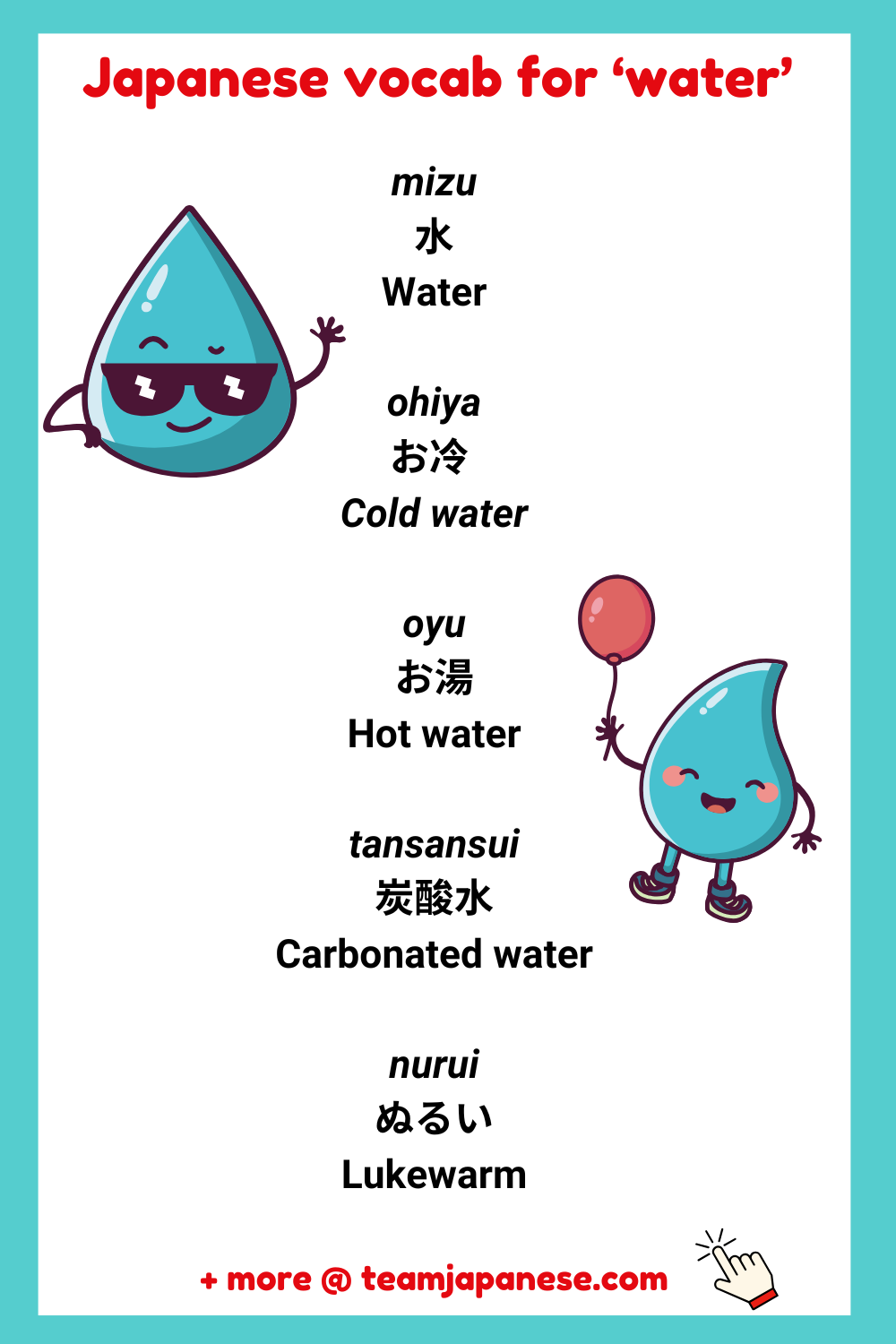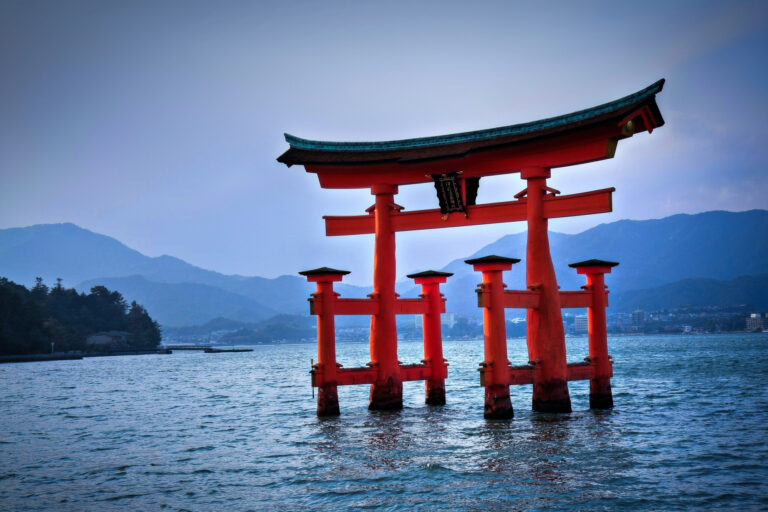Water is one of the most essential elements of life – and it shows up in many parts of the Japanese language too!
The everyday word for water in Japanese is mizu (水). But did you know there are separate words for hot and cold water in Japanese? There are also several interesting kanji compounds containing the kanji for water!
In this post, we’ll explore how to say ‘water’ in Japanese, along with some other common water-related words and phrases you’re sure to come across.
How to say ‘water’ in Japanese
Mizu
水
Water
‘Water’ in Japanese is represented by the kanji symbol 水. Its kunyomi or ‘Japanese reading’ is mizu.
Mizu is the standard word for water in Japanese. It is used to refer to water in general, from drinking water to a body of water.
Its onyomi, or ‘Chinese reading’ is sui. The sui pronunciation is used when 水 is used in a kanji compound (when more than one kanji is combined in a word). An example of this is ten nen sui (天然水 / てんねんすい), which means ‘natural spring water’.
Ohiya
お冷
Cold water
Ohiya (お冷 / おひや) is a super commonly used word in restaurants in particular!
When you sit down at a restaurant in Japan, many establishments provide complimentary wet hand towels called oshibori (おしぼり) and cool drinking water, referred to as ohiya!
The kanji 冷 means ‘cool’ or ‘chilled’, while the o at the beginning is the ‘honorific o’, which is affixed to certain words to make them more polite.
Although the kanji 水 is not present in this term, we see the radical 冫which is known as the symbol for ice (or water with the ability to turn to ice) and is said to resemble two drops of water.
If you want to order a drink of water in a restaurant, using the term ohiya will make your Japanese seem fluent and natural! Not to worry though, as mizu is also perfectly understandable if ohiya slips your mind in the moment.
Oyu
お湯
Hot water
On the opposite side of the scale, there is also a term for referring to ‘hot water’. Oyu (お湯 / おゆ) uses the same ‘honorific o’ which is affixed to the kanji 湯 (yu). This means ‘hot water’ or ‘hot bath’.
If you are the type of person that prefers warm water over chilled, you can ask for oyu when ordering in a restaurant!
Oyu is also used when talking about running hot water for a bath, or for boiling water needed for making tea.
In this term we see another kanji radical 氵which represents water. This supposedly depicts 3 droplets. You will find that many kanji which are written using this radical will relate to water!
Learn kanji the easy way by mastering radicals - the building blocks of kanji. By the end, you’ll master over 75% of the must-know joyo kanji!
Other water-related words in Japanese
Nurui
ぬるい
Lukewarm
Nurui (ぬるい) translates to ‘tepid’ or ‘lukewarm’, and as such is a useful adjective related to water.
For example, if you left your cup of coffee too long before drinking, it can become nurui, or if the bath is too hot you can add some cold water to make it more nurui.
Example:
Ofuro ga atsu sugiru no de, mizu wo umete nuruku suru
お風呂が熱すぎるので、水を埋めてぬるくする
おふろがあつすぎるので、みずをうめてぬるくする
Since the bath is too hot, I will put some cold water to make it lukewarm
Tansansui
炭酸水
Carbonated water
Carbonated water is not as common in Japan as it may be in European countries. If you ask for mizu or ohiya, the waiter will customarily serve still water.
However, you can of course request sparkling water in a restaurant by asking for tansansui (炭酸水 / たんさんすい). You might also hear the romanized term supaakuringu uotaa (スパークリングウォーター / すぱーくりんぐうぉーたー).
Tansan means ‘carbonic acid’, which is the chemical used to create bubbles and adds that slight bitter taste to water.
Mizuiro
水色
Blue
You might recall from our post about ‘colours in Japanese’, that the word for ‘blue’ in Japanese is ao (青 / あお). Another word for ‘blue’ is mizuiro (水色 / みずいろ) which literally translates as ‘water colour’.
Mizuiro is generally used to describe a light shade of blue.
Bousui
防水
Waterproof
Bousui (防水 / ぼうすい) is the Japanese phrase for ‘waterproof’. The first kanji 防 means ‘to ward off’ or ‘protect’.
Example:
Kono kamera wa bousui desu
このカメラは防水です
このかめらはぼうすいです
This camera is waterproof
Suiyobi
水曜日
Wednesday
In our ‘days of the week’ post, we discussed how the elements are incorporated into the names of each day in Japanese. ‘Wednesday’ happens to be the ‘water’ day of the week!
Suiyoubi (水曜日 / すいようび) is named after the Japanese name for the planet ‘mercury’, suisei (水星 / すいせい).
In traditional Eastern mythology, the planet Mercury relates to the element of water, and in turn so does the hump day of the week!
Learn everyday Japanese
So you know some basic and fun words to talk about water in Japanese. Did you have a favourite? Personally, I love thinking of Wednesday as ‘water day’!
If you’d like to keep building your Japanese vocabulary in a fun and practical way, our check out JapanesePod101 for free lessons and resources to support your learning journey.
JapanesePod101 is our top recommendation to learn Japanese online. We love the fun, current audio lessons and interactive online tools. Sign up for your free lifetime account and see for yourself!
Related posts


Hannah is a half Irish/half Japanese girl living in Ireland. Her love for Japan and the Japanese language led her to studying languages and translation in university where she specialised in Japanese. She spent a year studying abroad at Rikkyo University in Tokyo. In her free time, Hannah enjoys using her sewing machine to upcycle clothes and create new pieces!


